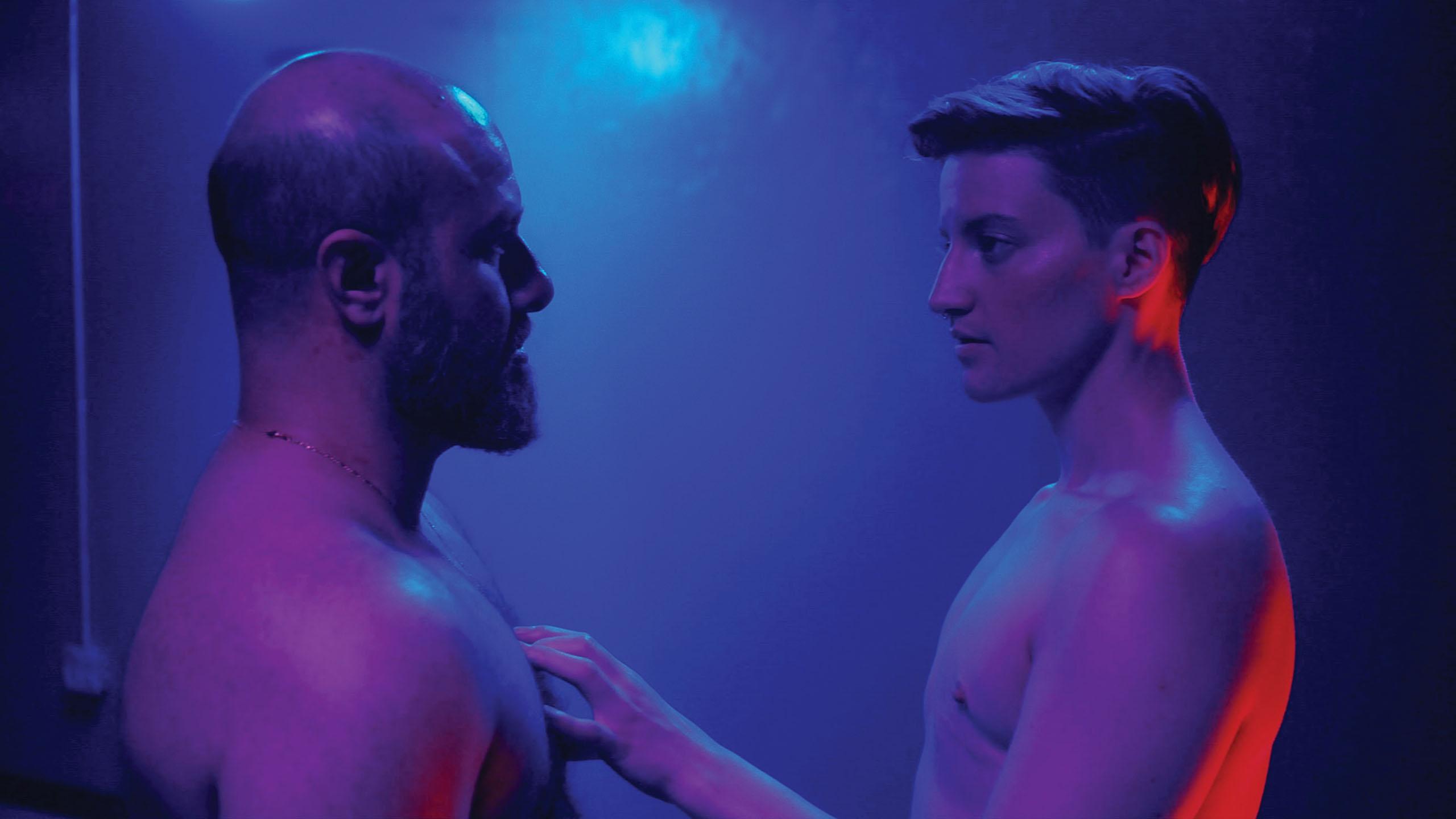In Jules Rosskam’s Desire Lines, an audacious odyssey unfurls, fearlessly venturing into uncharted territories. Seamlessly blending an array of artistic mediums, the film immerses itself in the intricate nuances of transmasculine sexuality, journeying through the diverse landscapes of different historical periods. With every frame, it deftly intertwines strands of expression, beckoning viewers into a mesmerizing exploration of desire across the spectrum of time and identity.
In the narrative fiction segment penned by Nate Gualtieri, we are introduced to Ahmad, a humble Persian-American transgender man in his early sixties, portrayed with grace by Aden Hakimi. His odyssey unfolds within the nurturing embrace of an LGBTQ+ archive nestled in the heart of Chicago. Here, Ahmad’s path intertwines with that of Kieran, brought to life by the charismatic Theo Germaine—a young, self-assured transmasculine individual. Against the backdrop of early 2020, their encounter blooms, yet the looming presence of the COVID-19 pandemic adds an intricate layer of depth to their unfolding tale.
In Ahmad’s scholarly odyssey, the enigmatic allure of bathhouses emerges as a captivating focal point, offering a lens through which to scrutinize the intricate responses to the HIV/AIDS crisis and the ensuing closures that swept through American cities. Imbued with fervent dedication to his research, Ahmad embarks on a profound journey into the narratives of queer trans men entwined in intimate liaisons with cisgender counterparts, often amidst the evocative backdrop of bathhouse settings. Despite the absence of firsthand experience within these hallowed halls, Ahmad’s scholarly pursuits ignite the fires of his imagination, transporting him to vividly reimagined scenes from eras past. From the effervescent post-Stonewall epoch of the late 1970s to the somber ambiance permeating the 1980s, evinced by community notice boards bearing poignant obituaries, Ahmad becomes enveloped in these historical vignettes. As his exploration delves deeper, Ahmad finds the boundaries between reality and reverie increasingly blurred, occasionally encountering spectral manifestations of fellow researchers from the sanctum of the reading room, imbuing his academic endeavors with a surreal and ethereal essence.
Ahmad’s academic journey is illuminated by a series of contemporary videos that open windows into the intimate encounters between transmasculine individuals and cis gay men. These candid interviews, devoid of embellishment and expertly edited for pacing, provide an unfiltered glimpse into the diverse spectrum of transmasculine experiences. From candid discussions on kink, BDSM, and sex work to introspective reflections on body image and verbal expressions of intimacy, the subjects lay bare their truths with unwavering authenticity. Moreover, animated group dialogues and carefully crafted scenarios add layers of depth to the film’s exploration of gender dynamics, sexual identity, and societal norms.
In current conversations, there’s a palpable buzz around the discourse on unprotected sex, as well as the ongoing challenges faced by healthcare providers in meeting the unique needs of transgender men in relationships with men. These interlinked themes are intricately merged in the film, forming a dynamic mosaic of dialogue that invites viewers to explore a range of perspectives instead of adhering to a single storyline.
Through the lens of history, Ahmad’s story intertwines with that of Lou Sullivan, a trailblazer in the tapestry of transgender history. Sullivan’s honest conversations and heartfelt letters to fellow activists reveal profound truths about the experiences of gay transgender men, forging connections that transcend time and empower generations. As Ahmad travels through the corridors of the past, he elegantly navigates the intersection of antiquity and modern dialogue. In this space, the ever-changing language and expanding horizons of gender weave a vibrant mosaic of resilience, affirming the enduring presence and indomitable spirit of transgender men throughout history.
In excavating transmasculine histories and fostering dialogue between past and present, Rosskam crafts a vital cinematic document that is sure to ignite meaningful conversations and inspire further exploration. Desire Lines stands as a refreshingly sex-positive and intellectually stimulating work, deserving recognition alongside other films that explore the intersections of trans identity and history. In an era marked by threats to trans rights, authentic representation such as this serves as a poignant reminder of the humanity and complexity inherent in human connection—a sentiment echoed in the film’s joyous final sequence.
Director: Jules Rosskam
Featuring: Theo Germaine, Aden Hakimi, Mike Geraghty
Writers: Jules Rosskam, Nate Gualtieri
Producers: Angie Gaffney, Amy E. Powell, André Pérez, Brittani Ward
Music: Melissa Dyne
Cinematography: Marie Hinson
Streaming Availability:


